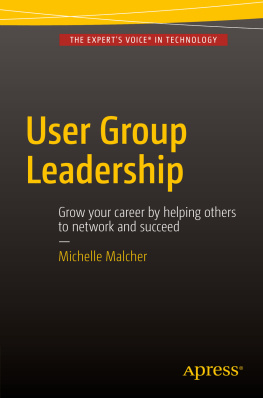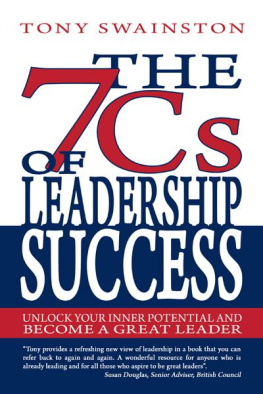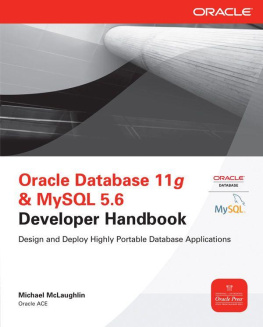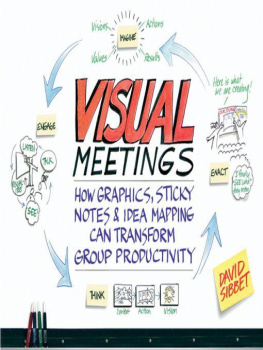One of the best career decisions I have ever made was becoming a member in a user group, and probably the best career decision was volunteering for a user group.
As you can tell, I am a strong believer in user groups and the advantages that they provide. The opportunities in the development of a user group are incredible: bringing together a community of like-minded individuals for education, networking, and working with the vendor. I get excited about the knowledge sharing and possibilities of problems being solved and new solutions being developed. In this chapter we will discuss the development of a group, with additional information to come in future chapters about building leaders and volunteers. These discussions should provide you with what is needed to create and build a group.
User groups are important for the users in a community for networking, growth, and learning. They are important for the vendors because there is an active community providing feedback. We cannot forget to mention the group of users that they now have engaged and already interested in their products. There are mutual benefits to the company and the users in the community and we are just scratching the surface here of a few of the benefits.
Building a community of common users and professionals is an excellent way to gain valuable knowledge and develop a career that is rewarding and enjoyable in an area of interest. There are plenty of other soft skills that are picked up along the way, with the benefit of additional learning and opportunities. There is extra effort in being involved and starting the group but the benefits far outweigh the work and time put into the group. Investments benefit both sides and the development of a user group will be able to be successful if both are seeing the value of their investments.
Reasons to Begin
There are four reasons that drive an interest to create a user group. In addition to having enthusiastic users and volunteers, the mission of the group centers around one of these four reasons. If goals or mission is not part of the development, it will be difficult to gather and build the community. A common thread will allow for the group to be focused and developed around the same reason. The four threads that we will discuss in the rest of this chapter are:
Common Purpose
Common Problem
Common Need
Culture
It is possible that some of these reasons have overlap, but the main focus will fall under one of these with some possible additional goals that pull in the overlapping areas. Starting here is important to make sure that the group will be able to be a viable long-lasting group. The development of a group might be a difficult process and a common thread will keep the movement going.
A Common Purpose
Technology, area of interest, a vendor, a company, and industry are all common purposes for a group to be developed. It might be a group of technology professionals wanting more from the technology or even just excited about the technology that they are working with and wanting to see it grow and advance.
Database management and security are my areas of passion. I tend to spend time outside of working hours gathering more information and researching on my own. There are LinkedIn groups I am part of in these areas, and user groups where I am a leader and member of the community. I am not alone in this area; there are other groups out there with the same area of interest. The goal would be to bring a group together that can have this common purpose, which might be to advance knowledge, develop careers, and provide growth in a new or existing area.
A common purpose does not have to come from just a group of individuals. A company could have the purpose of providing the customer base with an excellent experience, and it is important to recognize that a user community can assist in developing this strategy. From the company perspective, there is a wide set of advantages to polling the customer base and providing information to a user group. A company might be the one even developing the group or it starts to evolve out of the customer base. Even with it coming from the company, there might be an opportunity to pull this out to be an independent group. Discovering that development of the user group is moving outside of vendor control would be meeting the purpose to form an independent group.
There is a sense of passion and drive around a purpose and meaning for the group, for example, wanting this area to grow and succeed or to be the best in the industry. Purpose does focus on a main area, which probably makes it easier to articulate a mission and goal to bring a community together.
A Common Problem
Developing a group can stem around a common problem that needs to be addressed. In looking for an answer to a problem or troubleshooting some gaps or weaknesses in product, discussions between the community and vendor are very important. An isolated problem is not useful for driving people together, but an problem like software installation failures on a common platform or limited documentation which causes one to develop their own process just to be able to complete the installation would be a more general problem.
Another example of a common problem would be lack of a secure configuration, which would be expected by default. If the users of the software take these problems back to the vendor, the vendor has the opportunity and support of a community to take a look at the problem and then to help validate and test that the problem has been resolved. This is also an area where the vendor can step in and provide support and develop an inside community to look at these important issues.
In developing a user group around a common problem, what happens when the problem is solved? Do you hope for another problem to rally around? Or does the group dissolve after the resolution of the problem. If you are to put the effort and energy in creating the group, it would be a disappointment if there was not a reason to continue. A common problem will need to lead into another purpose or mission statement for the group, but more likely it can lead to a common need, especially if you consider the problem around a secure configuration, and how this could develop into general security and review as there are new releases and other opportunities to support these needs.
A Common Need
The group can develop out of a need from the users or vendor. A need can come out of solving a problem or a need might be part of the problem, but a need also can be much more. It might be the ability to adapt to an ever-changing environment in planning for the future, or a need to have enhancements to a product and services.
Sometimes one company can have specific needs or have a unique situation that does not necessarily relate to others, but this is rare. Even if thinking the situation is unique, it might not be; it is usual that this involves more than one group of people or a company. The community will only be able to grow around a need if it does reflect one common to the industry, something that will support the users better or help plan for the future.
A common need might be education provided by the users. In understanding how technology is used by other companies, the information from other users can provide examples of what others are doing. Best practices, standards, designs, and configurations are all excellent areas to educate others and share ideas. Especially in the technology fields, topics such as upgrades, patching, new features in the releases, and how the environments are configured are top education choices that user community can provide. Technology professionals are continuously learning to deal with the complex environments and ever-changing technology, and education is high on the list for joining a user group. Networking is close behind. However, we are getting ahead of ourselves; we will discuss networking in later chapters with strategies and planning.











